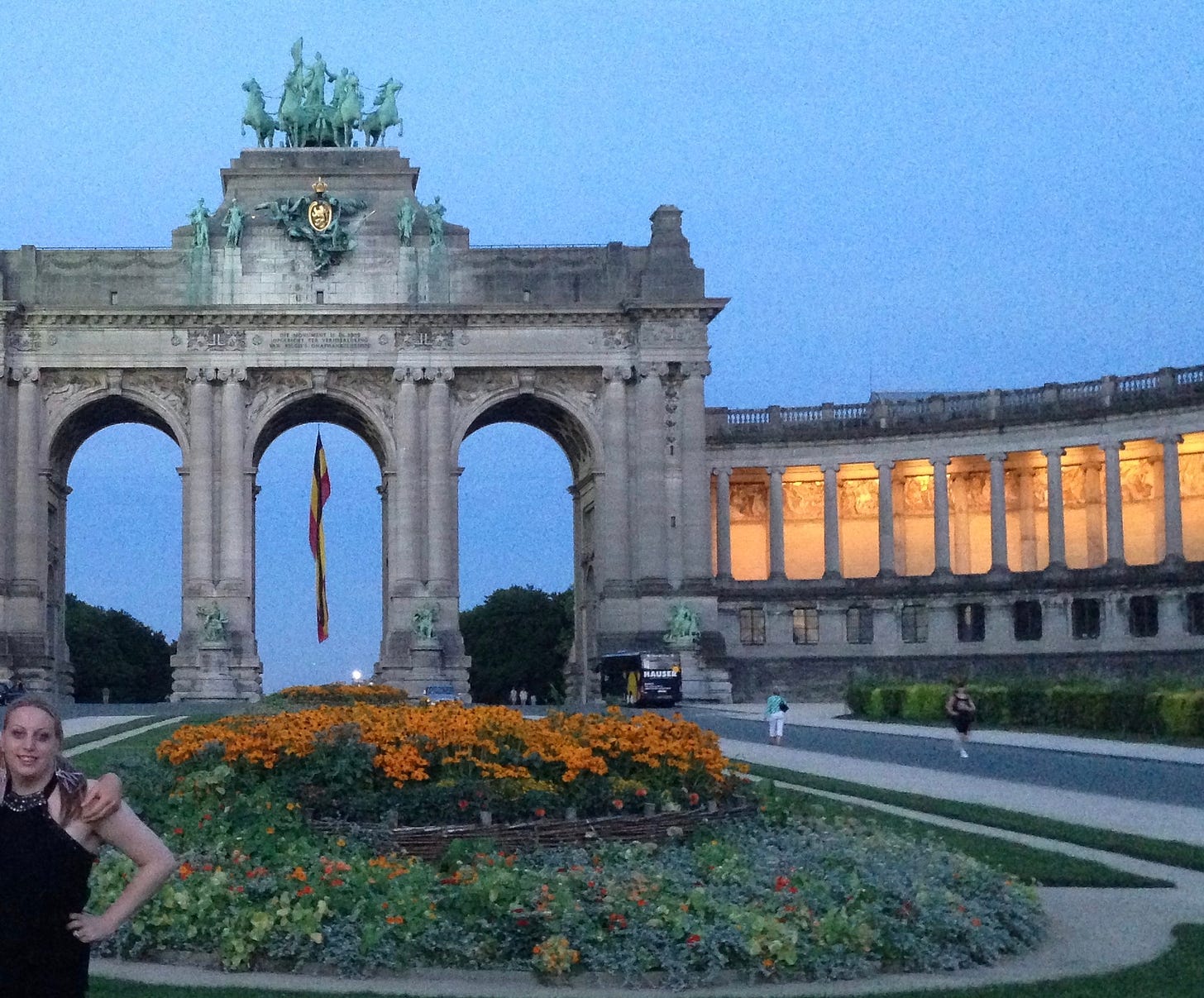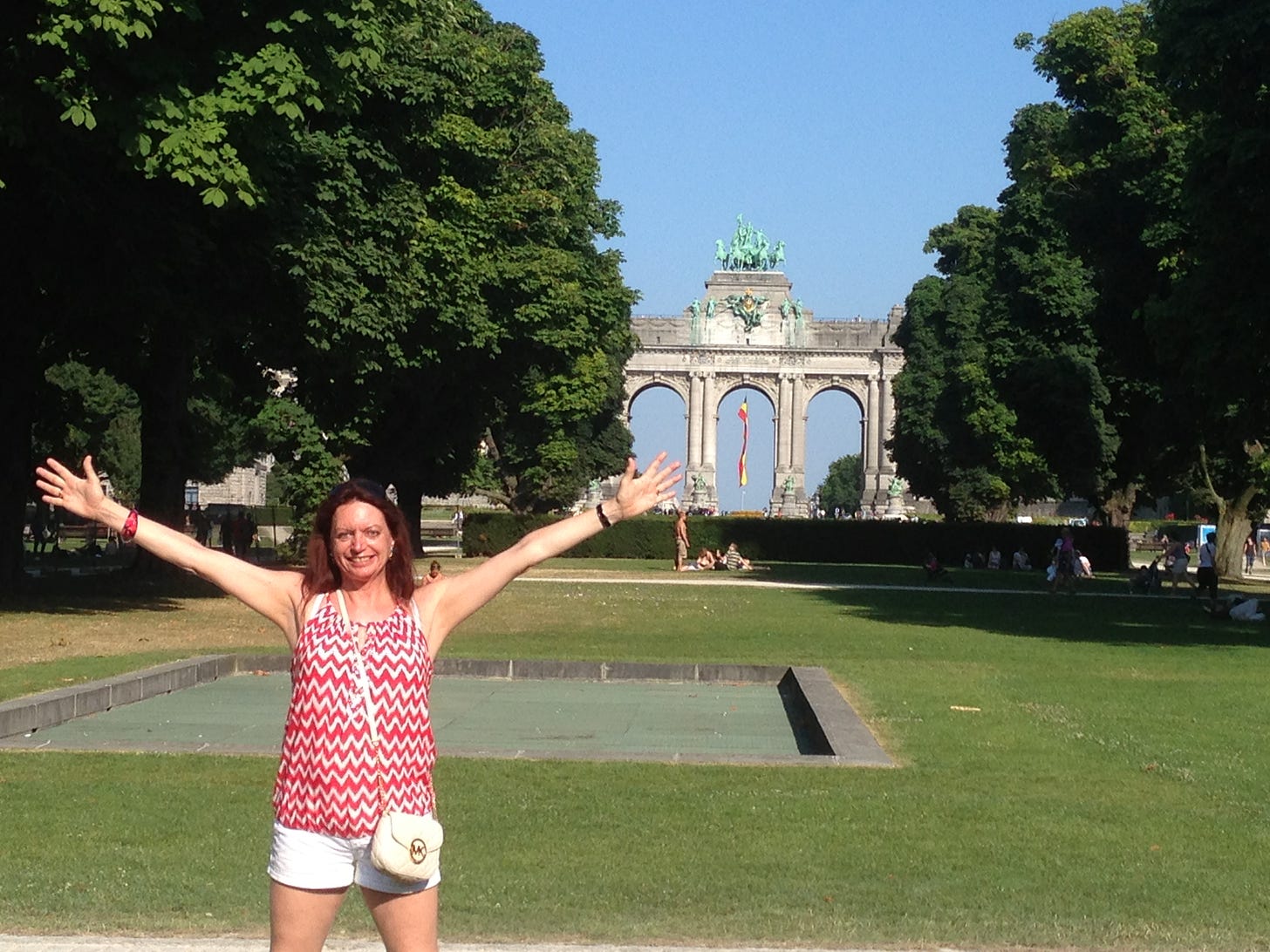I moved to Brussels...
...but bureaucracy will tell you it was my wife that moved there.
This post is the final of four in a series inspired by Nolan Yuma’s:
“A support group for people who have to deal with bureaucrats.”
My first contribution a few weeks ago was “The Lensmann from Orkdal”. Two weeks ago, to celebrate my wife’s first Canada Day, I told you about “The Flagpole Route to Permanent Residency”, and last week, it was all about the time I almost became a Danish citizen. This week, it’s about the move to Brussels that began the final decade of my four-decade-long gap year.
Although my role had, at least in part, been a corporate one since the early 1990s, I wasn’t among the privileged that sat in the corporate office in Belgium. For the first five or six years after my promotion, I remained in Oslo. I, the person who had been considered too old, too educated, and too opinionated to be capable of a hotel security guard job had advanced to become responsible for corporate safety and security in our still small but growing company. Safety and security weren’t considered important enough to be a full-time job in a hotel company, so my title was Special Programmes Coordinator. The other “special programmes” I coordinated were loyalty programmes, travel agent commission payments, and database marketing. I was proud of myself. Too proud to be jealous of the people on expat contracts in the corporate office in Brussels.
In 1998, I transferred to Copenhagen and remained there for a decade. That was plenty long enough to meet and marry the love of my life, become a step-dad to the world’s greatest 10-year-old and, slowly but surely, turn corporate safety and security into a full-time role as the company expanded into new markets and continued to grow at a pace unmatched by other European hotel companies at the time.
There were other corporate colleagues in Copenhagen. Some IT and procurement people with corporate responsibilities occupied the offices on Amager Strandvej, just across the road from Sundby Sejlforening where there was relatively cheap beer to be had on Fridays after work.
In 2002, there was a company movement to consolidate and centralize. Some of my office mates were given 24 hours to decide whether they would move to Brussels or leave the company. I waved goodbye to a couple of them at the airport.
My wife and I read the writing on the wall and decided to take our daughter on a weekend getaway to Brussels, without telling her we would be showing her what might become her new hometown in a few weeks or months.
We did all the things a normal family in Belgium would do. We went to amusement parks and every other fun thing you would do with a twelve-year-old while secretly hoping they won’t be too upset when you break the news to them that they will have to leave their friends, cousins, classmates, and grandparents behind because you’re moving to a new country.
It was almost as if the hotel knew what we were up to. When we checked in, the entire management team lined up in the lobby to say hello. We were upgraded to a suite and on the dining table there was the largest assortment of chocolate ever assembled outside of Willy Wonka’s factory. We gave our daughter permission to take an overpriced Coke out of the minibar that registered every can on our bill as soon as it was lifted from the fridge.
As soon as she closed the fridge, there was a knock on the door. A bellman with a big smile and a huge tray of assorted soft drinks said,
“Compliments of the manager!”
We had a great weekend. On the flight home, we hinted to our daughter that there was a possibility we might have to move to Brussels at some point.
“I’m not stupid.”, was her reply. It was accompanied by an eye-roll that any full-blown teenager would have been proud of.
Sure enough, a few weeks after we’d visited Brussels, I received a call from my boss.
“We know your wife has her own business…”, he began, and he continued by saying that he had been asked to encourage his remote worker to consider moving to Brussels.
“We can move anywhere, anytime,” I said.
I could hear the relief on the other end of the line even though he didn’t say anything.
He tensed up again when I continued.
“You just need to prove two things to me. Prove that I can do my job better from an office there than from here, and prove that the company understands it’s moving a family, not just a box on the organization chart.”
About a nano-second later, he replied, “It’s OK, you can stay there.”
Four years later, things had changed. Our daughter had finished her compulsory schooling and had been accepted into a high school exchange programme that would send her abroad for a year, and the company had gone through an IPO.
Suddenly, sitting in the HQ seemed much more sensible. I phoned my boss and suggested we look into making a transfer.
She, I also had a new boss, was in shock because no one had ever suggested that they would voluntarily move to Brussels, which was routinely voted the most boring city in Europe.
She happily agreed to the suggestion and the wheels were set in motion.
As soon as our daughter’s flight to the US disappeared into the clouds, we started packing.
(Don’t worry, she knew we were moving, and she made the most of her years in Belgium when she returned…)

I know what you’re thinking. You’ve been reading this newsletter, part of Nolan Yuma’s series on bureaucracy and immigration and you’re wondering when I’ll touch on the subject at hand… don’t worry, I’m getting there now.
Bureaucracy raised its head just before we moved. The company had consulted with one of the world’s largest consultancies because I, a Canadian citizen, couldn’t just move to Belgium. I would need to jump through many hoops, which, fortunately, weren’t real hoops, they were just complicated matters of paperwork. However, the consultancy convinced our company that their exorbitant fees were well worth paying because they had found a workaround.
I wouldn’t move to Brussels.
My wife would.
I would simply tag along as her husband.
Their only concern was that the bureaucrats in the town hall might not know that this was a completely legal workaround. To ensure things would go smoothly, they would send a consultant along with us to the town hall. I’m sure the fee for that consultant’s hour or two of service wasn’t much more than a week’s wages for normal people like us.
It was a nice, sunny, September morning when we arrived at the town hall. The consultant was easy to find. She was standing outside on the steps smoking. The four or five butts at her feet suggested she had been there at least ten minutes.
If she was easy to find, she wasn’t quite so easy to understand. We said hello and she answered in French. Maybe it was English, but it sounded like French. With a combination of hand-waving, broken English, and some schooboy French, she told us not to worry. She would do the talking.
When it was our turn the three of us approached the wicket we had been called to. Our consultant explained to the municipal clerk, in French that was clear and condescending enough for me to understand, that even if I was the only working member of our family, it was completely legal for me to be accepted as a resident in Belgium because my EU citizen wife had chosen to move there.
The clerk looked at her. Then he looked at us. Then he looked at her again. In excellent Oxford English, he said.
“Go outside and have another cigarette. We deal with similar situations here every day. We know what the law is. We can do this in English.”
Then, to us, he said, “Welcome to Woluwe St. Pierre!”

Stay safe, Always Care
87 stories are part of the Always Care Community, where we share memories, experiences, and lessons learned at the “University of Life”!
Thanks for reading and for supporting my work.
Please connect to learn more about how our experience and expertise can support you, your team, and your business.





I love that the workaround functioned. Also, I was curious about Brussels being voted the most boring city in Europe. When I typed it in English, that's what most of the sites said. When I typed it in Spanish, places like Bielefeld, Luton and Milan popped up. When I typed it in Flemish, places like Reykjavik, Bern, and Buisberg popped up. I tried a few more, and the places kept changing depending on the language.
That’s interesting. We never felt bored in Brussels! I think it’s proximity to places like London, Amsterdam, Paris, or Champagne might mean it’s hidden in the shadows. The decade we enjoyed in the European capital was wonderful!